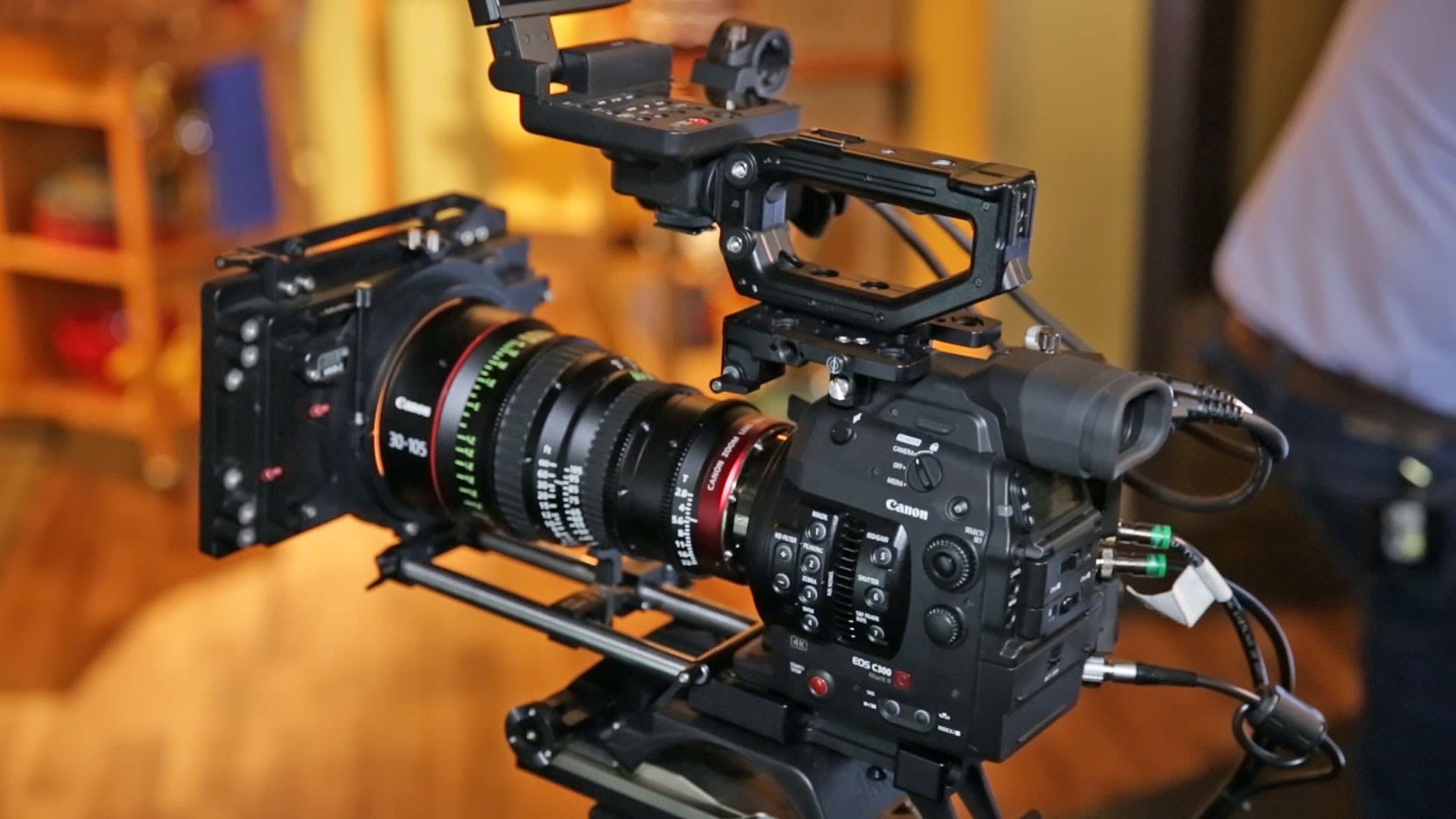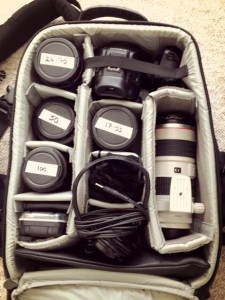Universities, film schools, specialist courses – all can be a great place to start if you want to equip yourself with useful skills for a job working in video or film production. However, there are some things that just can’t be learned in an educational environment. Only by talking to those already working in the industry and gaining experience yourself will you learn some things that no book or lecture could ever prepare you for. So listen up, we’ve got a few industry insights here. Some are positive and some are not, but if you want to work in this industry you had better listen to the pros first before you dive in at the deep end.

Fatboy Slim appreciated the gig!
1. Every new job you land, no matter how big or small, becomes a huge personal victory.
This is especially true to start ups and freelancers. It is much harder to get new clients than it is to get repeat business from an existing one. Even landing little jobs that only last a few hours can give you that warm feeling inside that something is working because people want to hire YOU. This in turn will help you stay driven and motivated. Enjoy it!
2. How tremendously adaptable you sometimes have to be.
To get where you want to be in your career you may find yourself sooner or later doing something that you don’t really want to do (well, that’s life!) but you’ll realise that it’s a necessity to making any sort of progress. Whether it be learning a new skill in an area you’re not confident in or taking on work in a completely different industry just so you can survive until your next video job comes in, if you really want to succeed you’ll do what it takes. You may just find it character building too.
3. Marketing is so incredibly, ridiculously important.
Whether you freelance or run your own business, you simply can’t avoid the subject of marketing or you will fail. Word of mouth is often described as one of the best ways of getting work in an industry as small as this, and this is true, but first impressions count and knowing who it is you are trying to work for and how to target them is key to starting new working relationships. Included in this is the ability to sell yourself, plus with growing demand for online video content the marketeers out there should be your best friends!
4. GAS.
Not the poisonous kind, unless you let it get the better of you. GAS stands for gear acquisition syndrome. It is actually a thing. In the western world we are suckers for consumerism and just love to own stuff but this is especially true in video production for cameras are sexy, lenses are bokehlicious and a DJI octocopter – well, who wouldn’t want one of those?
It’s very tempting to spend lots of money and think your career will instantly bloom but if you’re not careful you could get stuck in a never ending process of continually needing to buy stuff and never make any money as a result. For some of us of course it is important that you buy the right tools for the job but perhaps consider whether you really do need that new flashy gizmo or if hiring would be a more sensible option. And don’t forget, your talent counts for something too.
There’s some brilliant advice on the matter in this filmmaker magazine article by DOP Sean Porter including one bit that really stuck with me:
“We have to be very cognizant about the impact, however minute, we make when we mix our creative responsibilities with enterprise. Your gear is a powerful influence on your work, both good and bad. I think stepping up means knowing which is which, even if it’s not the answer you want to hear.”
Wise words.
5. How to balance multiple jobs.
This for me, and I’m sure many others, is probably one of the hardest things about starting off in this industry that’s on this list. I’m not just talking multiple film or video jobs; I’m referring to balancing the self employed work with the employed. The paid with the unpaid. The desirable with the reliable. The big question that nobody seems to have the answer to is:
How can you get experience without a job when you can’t get the job without experience?
You have to start somewhere. Maybe you’ll be working part time so many days a week so you can focus on the video work on your days off – if you can afford to live off part time wages. But then, what if your perfect job comes up while you’re at work and you could be potentially missing out on your big break? If you keep trying to get time off from your reliable work are you likely to keep that job for long? On the contrary if you always keep your diary open, how do you know that you’re definitely going to land more video work to pay the bills? Juggling the reliable and the desirable work can be an absolute nightmare and it’s one thing that no educational institution can ever prepare you for.
My advice is to keep your options open and explore the different possibilities available to you until you find something that works. Everybody needs to earn somehow but what ends up working for one person may not work for someone else. I recently wrote about how my non video job helped me learn new transferable skills but the most important thing to understand is you have to be prepared to work your socks off, whichever path you decide to tread.
Oh, and one more thing. Dealing with a clash of job offers never gets any easier.
6. When to say no.
I must refer again to the article mentioned earlier by DOP Sean Porter, who deals with this point in great detail. Knowing when to say no can be another one of the hardest things to deal with in this industry. Taking on too much work could leave your clients unsatisfied or affect your personal life and relationships in a negative way. It’s another thing that can only be learned through experience and through applying a good level of judgment every time an opportunity arises. We’ve all accepted those jobs we’d wished we’d declined but it’s all about learning from these mistakes so that our future selves won’t curse our present selves into oblivion!
7. Steady sources of income can disappear suddenly and you may not know why.
A client may go on sick leave or change premises, marketing budgets may be slashed or a competitor may offer your clients better value. In fact, there are a whole host of reasons why you might lose a steady client and it can be very hard and frustrating when this happens, especially if you don’t know why.
The answer? Don’t take it personally, avoid complacency and learn to be like a gecko – adapt! Don’t stress and remember that factors which are beyond your control can be a blessing as well as a curse in your work life. It also pays during busy times to save for a rainy day.
8. How to manage your taxes.
Tax returns, accounting, filing..yawn. It may be boring but unfortunately it’s something that none of us can avoid doing, whether we freelance or run a business. Not to suck the fun completely out of the creative industry at hand but the more you learn about tax returns and the like the earlier on in your career the easier it will be for you to stay on top of your money and make sensible decisions throughout. You wouldn’t want any nasty surprises now!
The first place to look for information on all things tax is the HMRC website.
9. Your competition may also be your friends.
It’s not all doom and gloom. Working in such a small industry means we often bump into familiar faces and that includes the competition. The beauty of this, unlike most industries, is your competition could not only help to keep you on your toes but they could potentially be a reliable stand in for you when you need a helping hand or could loan you equipment and vice versa. There’s also a thing called referral fees for the business minded among us!
10. How to switch off and relax.
Last, but certainly not least. You spend so much of your time and energy hacking away at your career that no matter where you are on the ladder, it can be nigh on impossible to switch off from work when you’re worried about things like where your next pay cheque is, if your clients will like your work and what your competitors are up to. Whether running a business or working for yourself and with dangerous cross overs between work and play on your social media accounts, switching off from the world of work can be very difficult indeed. It could be viewed as a good thing as we are just that determined to succeed, but don’t let it consume you. Allow yourself some ‘me time’ and enjoy those rare opportunities to turn off your phone. Your other half will appreciate it!
There is no real single secret to a successful career in any of the creative industries, but hopefully these insights will help you make the right decisions early on. If you make mistakes along the way however, that’s OK, it is part of your professional development no matter what career you decide to embark on (except for the tax issues – we wouldn’t want you getting in trouble!).




